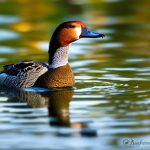Mini duck breeds, also known as miniature ducks or bantam ducks, are small-sized ducks that have been selectively bred to be smaller than their standard-sized counterparts. These ducks are typically one-third to one-half the size of regular ducks, making them a popular choice for small-scale farming and backyard poultry enthusiasts.
The history of mini duck breeds can be traced back to the 19th century when breeders in England and the United States began selectively breeding ducks for their smaller size. These breeders aimed to create ducks that were not only aesthetically pleasing but also easier to manage and maintain.
In recent years, mini duck breeds have gained popularity among farmers and hobbyists alike. Their small size makes them easier to handle and requires less space compared to standard-sized ducks. Additionally, mini duck breeds are known for their high egg production, making them a practical choice for those looking to raise ducks for eggs.
Key Takeaways
- Mini duck breeds are smaller versions of traditional duck breeds, and are becoming increasingly popular among small-scale farmers and backyard enthusiasts.
- Raising mini duck breeds can provide a range of benefits, including a source of meat and eggs, pest control, and entertainment.
- Popular mini duck breeds include the Call, the East Indie, and the Silver Bantam, each with their own unique characteristics and traits.
- When choosing a mini duck breed, it’s important to consider factors such as temperament, egg-laying ability, and adaptability to your local climate.
- Housing and feeding mini duck breeds requires careful attention to their needs, including access to water, a balanced diet, and protection from predators.
The Benefits of Raising Mini Duck Breeds on Your Farm
1. Low maintenance: One of the biggest advantages of raising mini duck breeds is that they require less maintenance compared to larger ducks. Their small size means they eat less, produce less waste, and require less space. This makes them an ideal choice for those with limited resources or space.
2. High egg production: Mini duck breeds are known for their high egg production. Despite their small size, these ducks can lay a significant number of eggs throughout the year. This makes them a practical choice for those looking to raise ducks primarily for egg production.
3. Pest control: Ducks are natural pest controllers and can help keep your farm free from insects, slugs, and snails. Mini duck breeds are no exception and can be an effective and eco-friendly solution for pest control on your farm.
4. Fertilizer production: Duck manure is rich in nutrients and makes excellent fertilizer for your garden or crops. By raising mini duck breeds, you can not only benefit from their eggs but also from the nutrient-rich manure they produce.
5. Meat production: While mini duck breeds are primarily known for their egg production, they can also be raised for meat. Their small size makes them suitable for small-scale meat production, providing a source of high-quality, lean meat for your farm.
Popular Mini Duck Breeds and Their Characteristics
1. Call ducks: Call ducks are one of the most popular mini duck breeds. They are known for their small size, upright posture, and distinctive quacking sound. Call ducks come in a variety of colors and patterns, making them a favorite among poultry enthusiasts.
2. Bantam ducks: Bantam ducks are another popular mini duck breed. They are known for their small size, round bodies, and friendly temperament. Bantam ducks come in various colors and patterns and are often kept as pets or for exhibition purposes.
3. East Indies ducks: East Indies ducks, also known as Black East Indies ducks, are a unique mini duck breed known for their striking black plumage with a greenish sheen. They have a compact body and upright posture, making them an attractive addition to any farm or backyard.
Each mini duck breed has its own unique characteristics and traits that make them suitable for different purposes. It is important to research and understand the specific needs and requirements of each breed before making a decision.
How to Choose the Right Mini Duck Breed for Your Needs
When choosing a mini duck breed for your farm, there are several factors to consider:
1. Climate and environment: Different duck breeds have different temperature and climate requirements. Some breeds are more cold-hardy, while others thrive in warmer climates. Consider the climate and environment of your farm before choosing a breed to ensure they will be able to adapt and thrive in their new home.
2. Purpose of raising ducks: Determine the primary purpose of raising ducks on your farm. Are you primarily interested in egg production, meat production, or simply having ducks as pets? Different breeds have different strengths and characteristics that make them more suitable for specific purposes.
3. Space availability: Consider the amount of space you have available for raising ducks. Mini duck breeds require less space compared to standard-sized ducks, but they still need room to roam and access to water for swimming and bathing.
By considering these factors, you can choose the right mini duck breed that will best meet your needs and ensure a successful and enjoyable experience raising ducks on your farm.
Housing and Feeding Mini Duck Breeds: Tips and Tricks
1. Housing requirements: Mini duck breeds require a safe and secure housing area to protect them from predators and the elements. Provide a sheltered area with adequate ventilation, nesting boxes for egg-laying, and a secure fencing or enclosure to prevent escape.
2. Feeding requirements: Mini duck breeds have similar feeding requirements to standard-sized ducks. They should be provided with a balanced diet consisting of commercial duck feed, fresh water, and access to forage or pasture if available. Supplement their diet with fresh fruits, vegetables, and occasional treats such as mealworms or cracked corn.
3. Tips for keeping ducks healthy: Regularly clean their housing area to prevent the buildup of waste and bacteria. Provide clean drinking water at all times and ensure they have access to a swimming or bathing area to keep their feathers clean and healthy. Monitor their health closely and consult a veterinarian if you notice any signs of illness or distress.
By providing proper housing and feeding for your mini duck breeds, you can ensure their health and well-being while maximizing their productivity on your farm.
Breeding Mini Duck Breeds: What You Need to Know

Breeding mini duck breeds can be a rewarding experience but requires careful planning and attention to detail. Here are some key points to consider:
1. Mating habits of ducks: Ducks are known for their unique mating behaviors, including courtship displays, pair bonding, and mating rituals. It is important to provide a suitable environment and conditions for breeding, including access to water for mating and nesting areas for egg-laying.
2. Incubation and hatching: Ducks typically lay their eggs in nests and incubate them for about 28 days before hatching. Provide suitable nesting boxes or areas for your ducks to lay their eggs and ensure they have a quiet and secure environment for incubation.
3. Caring for ducklings: Ducklings require special care and attention during their early stages of life. Provide a warm and safe brooding area with a heat source, such as a heat lamp or brooder, to keep them warm. Feed them a high-quality starter feed specifically formulated for ducklings and provide clean drinking water at all times.
By understanding the breeding process and providing the necessary care and attention, you can successfully breed mini duck breeds on your farm.
Health and Wellness of Mini Duck Breeds: Common Issues and Solutions
While mini duck breeds are generally hardy and resilient, they can still be susceptible to certain health issues. Here are some common health issues that may affect mini duck breeds:
1. Respiratory infections: Ducks can be prone to respiratory infections, especially in damp or poorly ventilated environments. Ensure their housing area is clean, dry, and well-ventilated to prevent the buildup of bacteria or mold that can cause respiratory issues.
2. Parasites: Ducks can be affected by external parasites such as mites or lice. Regularly inspect your ducks for signs of infestation, such as feather loss or excessive scratching, and treat them with appropriate parasite control products if necessary.
3. Nutritional deficiencies: Ducks require a balanced diet to maintain their health and well-being. Ensure they are receiving a high-quality duck feed that meets their nutritional needs. Supplement their diet with fresh fruits and vegetables to provide additional vitamins and minerals.
Preventative measures such as regular cleaning, proper nutrition, and monitoring their health can help prevent common health issues in mini duck breeds. Consult a veterinarian if you notice any signs of illness or if you have concerns about the health of your ducks.
Training Mini Duck Breeds: Techniques and Methods
Training mini duck breeds can be a fun and rewarding experience. Ducks are intelligent animals and can be trained to perform various tasks or tricks. Here are some basic training techniques to get started:
1. Positive reinforcement: Ducks respond well to positive reinforcement training methods. Use treats or rewards to encourage desired behaviors, such as coming when called or following commands.
2. Clicker training: Clicker training is a popular method for training ducks. Use a clicker to mark desired behaviors, followed by a reward or treat. This helps the duck associate the clicker sound with positive reinforcement.
3. Target training: Target training involves teaching the duck to touch or follow a target object, such as a stick or target stick. This can be useful for teaching ducks to move in a specific direction or perform certain tasks.
Training ducks can not only be entertaining but also practical. Trained ducks can be used for tasks such as herding, retrieving, or even performing in shows or exhibitions.
The Economics of Raising Mini Duck Breeds: Profitability and Sustainability
Raising mini duck breeds can be both profitable and sustainable, depending on your goals and resources. Here are some factors to consider:
1. Cost of raising ducks: The cost of raising ducks includes expenses such as housing, feeding, veterinary care, and equipment. While mini duck breeds require less space and feed compared to standard-sized ducks, there are still initial setup costs to consider.
2. Potential profits: The potential profits from raising mini duck breeds can come from various sources, including egg production, meat production, or selling ducks or ducklings. Conduct market research to determine the demand and potential profitability of your chosen mini duck breed in your area.
3. Sustainability of raising ducks: Raising ducks can be a sustainable practice, especially when it comes to pest control and fertilizer production. Ducks can help reduce the need for chemical pesticides and provide natural fertilizer for your crops or garden.
By carefully considering the economics of raising mini duck breeds and implementing sustainable practices, you can ensure a profitable and environmentally friendly venture on your farm.
Why Mini Duck Breeds are a Great Addition to Your Farm
In conclusion, mini duck breeds offer numerous benefits for farmers and poultry enthusiasts. Their small size, high egg production, low maintenance requirements, and pest control abilities make them a practical choice for small-scale farming and backyard poultry keeping.
By choosing the right mini duck breed for your needs, providing proper housing and feeding, understanding the breeding process, and ensuring the health and wellness of your ducks, you can enjoy the many advantages of raising mini duck breeds on your farm.
Consider adding mini duck breeds to your farm and experience the joy of these charming and productive animals. Whether you are looking for eggs, meat, pest control, or simply companionship, mini duck breeds are sure to be a great addition to your farm.
If you’re interested in mini duck breeds, you might also want to check out this informative article on poultrywizard.com about keeping guinea fowl with chickens. It discusses whether guinea fowl can live harmoniously with chickens and provides valuable insights for poultry enthusiasts. To learn more, click here: Can Guinea Fowl Live with Chickens? Additionally, if you’re looking for chicken coop and run plans or inspiration, poultrywizard.com offers a helpful article on farmhouse chicken coop designs. Discover practical tips and creative ideas for building your own coop by clicking here: Farmhouse Chicken Coop.
FAQs
What are mini duck breeds?
Mini duck breeds are small-sized ducks that are bred for their ornamental value, egg-laying ability, and as pets. They are smaller in size compared to other duck breeds and are known for their cute appearance and friendly nature.
What are some popular mini duck breeds?
Some popular mini duck breeds include Call ducks, Bantam ducks, Mandarin ducks, Wood ducks, and Carolina ducks. These breeds are known for their unique characteristics, such as colorful plumage, small size, and good egg-laying ability.
What is the average size of mini duck breeds?
The average size of mini duck breeds varies depending on the breed. However, most mini duck breeds weigh between 1-3 pounds and are around 10-12 inches in length.
What is the lifespan of mini duck breeds?
The lifespan of mini duck breeds varies depending on the breed and the care they receive. On average, mini duck breeds can live up to 10-12 years if they are well-cared for and provided with a healthy diet and environment.
What is the temperament of mini duck breeds?
Mini duck breeds are known for their friendly and social nature. They are easy to handle and make great pets for families with children. They are also known for their calm and docile temperament, making them a popular choice for backyard flocks.
What is the egg-laying ability of mini duck breeds?
Mini duck breeds are known for their good egg-laying ability. On average, they can lay up to 150-200 eggs per year, depending on the breed. However, it is important to note that egg production can vary depending on the individual duck and the care they receive.
Meet Walter, the feathered-friend fanatic of Florida! Nestled in the sunshine state, Walter struts through life with his feathered companions, clucking his way to happiness. With a coop that’s fancier than a five-star hotel, he’s the Don Juan of the chicken world. When he’s not teaching his hens to do the cha-cha, you’ll find him in a heated debate with his prized rooster, Sir Clucks-a-Lot. Walter’s poultry passion is no yolk; he’s the sunny-side-up guy you never knew you needed in your flock of friends!







